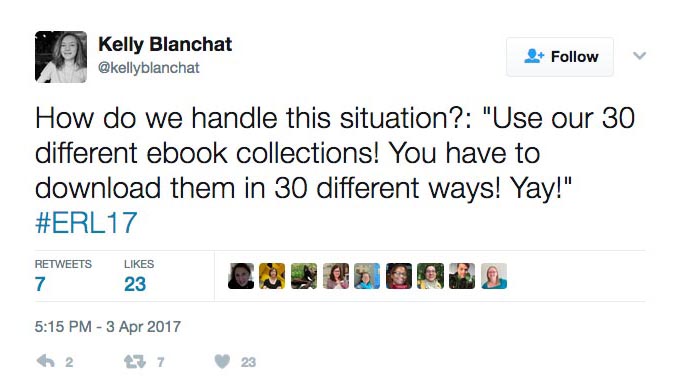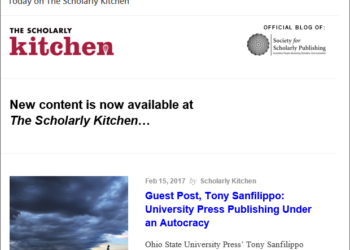Earlier this month at the 12th annual Electronic Resources and Libraries (ER&L) conference, the evolution of the ebook and its place in the library and scholarly community was an undeniable sub-theme – one that left me thinking any revolutionary vision for ebooks has been greatly stymied by disconnects between end-user perspectives and the agendas of scholarly resource suppliers.
More than a dozen sessions focused on ebooks during the three-day event. Whether addressing acquisitions, platforms, analytics, standards, or marketing, the overwhelming take-away was: Digital book evolution in academia and research turns out to be much harder than it seems. Librarians and publishers alike are fretting over low usage and uneven user uptake of diverse, ever-changing digital book products. This is leading us to a clear inflection point in the scholarly ebook evolution, with less urgency to launch the latest app or widget, and more willingness to slow down and listen to what’s actually helpful to readers in the digitization and reinvention of academic books.
Libraries are navigating administrative pressures to reduce print holdings and move to digital resources – options for which include a great deal of variation in business models, license terms, and interface designs, not to mention options that successfully integrate with local discovery and cataloging systems. Publishers continue to experiment with pricing and product models for ebooks that retain or exceed their print siblings. All the while, faculty and students demonstrate even greater multiplicity in their expectations and preferences for digital books.
The ER&L sessions on these themes left me thinking that the “ebook revolution” in our community has behaved much more like evolution, with those herky-jerky iterations of forward and backward steps along an uncharted, exploratory path. Lessons of supply-chain and market alignment from The Wide Lens came to mind throughout the conference, where product offerings are struggling to match consumer expectations. Studies like the Charlotte Initiative are demonstrating why students at all levels and across disciplines continually gravitate to print books over digital books, when faced with the choice.
Our community seems to be coming to terms with the reality that academic readers expect ebooks to behave differently than their print counterparts. Both formats offer distinct, yet complementary benefits, and books continue to serve key functions in most scholarly fields. An important presentation by Caroline Myrberg summarized recent research about ebook reader preferences and demands. Studies still show higher rates of retention and recall with print reading, as well as common ebook usability, legibility, and navigational challenges for readers of all kinds. These same users, however, highlight the search and portability benefits of some academic ebooks; where these features are lacking, ebook usage will suffer and users will prefer print instead.
Some librarians argue that print books will win out where the book options present poor and confusing user experiences, where a multitude of platforms vary wildly in their design and functionality. Some ebooks present DRM stumbling blocks and some allow for download to a personal device. Some require additional software installs and behave more like journal platforms. Some have advanced search and some require one user at a time. Librarians often struggle to manage this messy multi-platform message, to drive awareness and usage of ebooks, where they know a plethora of UX challenges await students and faculty – all of whom cannot possibly receive the necessary training to circumvent.
Kate Hill’s consortial data analysis about ebook successes and best practices demonstrates that usage will soar where all parties are lined up to facilitate a positive ebook learning experience. This requires a host of efforts joined up across librarians, faculty, publishers, and everyone in between, all focused on putting digital books directly into the student workflow, with clear direction and training. In fact, Hill concludes that much of what makes ebooks successful on campus is not high-tech or revolutionary – instead, old-fashioned collaboration, discoverability, and instructional guidance is the formula for positive ebook student engagement. Success requires student-centered rollout of user-friendly ebooks required by faculty and supported by librarians
To facilitate ebook successes on campuses, Steven Harris of University of New Mexico presents a “basic training” that aims to demystify and guide librarians through the complicated world of digital books. And yet, the very need for this type of training punctuates the dense technological and commercial landscape facing customers and readers alike. Harris’s latest research portrays the evolution of librarian attitudes toward digital books. The discourse analysis he presented at ER&L traces the fear and loathing that dominated in libraries just 5-10 ago, to a more empowered, yet cautious, willingness to embrace experimental approaches to ebooks that fit the academic needs at hand.
Whether appearing as “ebook” or “eBook” or “e-book,” the idea of a digital book fluctuates greatly – some think of Kindle downloads of the latest mystery novel while on vacation, while others dream of fully searchable databases of multidisciplinary monographs for scientific research. In part, this is due to the breadth of digital book formats and standards, not to mention the vast number and variety of scholarly books. The relevance and value of any content type or presentation differs from reader to reader, due to developmental level, technological literacy and training, disciplinary or regional culture, and much more that libraries and publishers cannot control or easily measure.
This is leading us to a clear inflection point in the scholarly ebook evolution, with less urgency to launch the latest app or widget, and more willingness to slow down and listen to what’s actually helpful to readers in the digitization and reinvention of academic books.
This is not to say we shouldn’t try! Books – just like journals, primary sources, and other texts – are clearly ripe for digital transformations and trials. At this stage in the ebook revolution, however, we must be smart and learn from the successes and failures of the very recent past and present as we move forward. Regardless of publishing innovations that aim to push readers beyond print or “print proxy” formats, scholarly book readers are not sitting idly by awaiting the perfect ebook.
I’m reminded of fellow Scholarly Kitchen Chef Joe Esposito’s recent observation that Amazon’s dominance in the digital book market has “put a damper on competition and innovation.” I would agree that Amazon / Kindle has monopolized many academic users’ experiences and expectations of ebooks. I would argue, however, that academic books and their function in scholarly work vary greatly across disciplines, which means more scholar-centric research is needed to determine our industry’s direction for the next chapter of the digital book. The content providers that target ebook developments on key scholarly use cases, like search and serendipity, will see greater user engagement and overall success – such as, JSTOR Lab’s ideas for reinventing the monograph.
Awareness of both the educational and commercial realities of ebooks has reached a new plateau in our collective march of progress. Sessions at this year’s ER&L conference clearly conveyed to me that our ebook users should be our guides in shaping the design and direction of digital book offerings, as we work together to further evolve the academic ebook.
Discussion
5 Thoughts on "The Ebook R/Evolution – Not as Easy as It Seems"
Is the ebook and its various “functionalities” on offer the issue (i.e. usability)? Or is it the multiplicity of platforms, business models and rights regimes? I suspect a move toward fewer platforms, less DRM and more business model alignment will do more to increase usage than any new user-centered functionality. But the hundreds of ebook publishers are moving through your noted “evolution” at different speeds, with different levels of risk tolerance and different levels of strategic awareness as concerns digital distribution, so the pain will be with us a good while.
One reason why evolution has beewn slow is the reluctance of publishers to take advantage of the full range of Technology’s ability to produce a book that is something more than a fancy facsimile of print books. Rare have been the experiments like Gutenberg-e and the ACLS Humanities Ebook projects inspired by Robert Darnton that actually seek to create a new kind of document that cannot be fully represented in print. There are cost challenges in making such experiments financially viable over the long haul, but this is no excuse for not trying.
VR books are the future. Transcending the 2D page/screen and entering the world of immersive letterscapes, diagrams, with each reference a hidden passage into a different environment depending on publisher branding and ux ideology.
Literally gives a whole new dimension to reader engagement. But also a radical break from tradition so maybe just wishful thinking.
http://5doc.org is the answer




